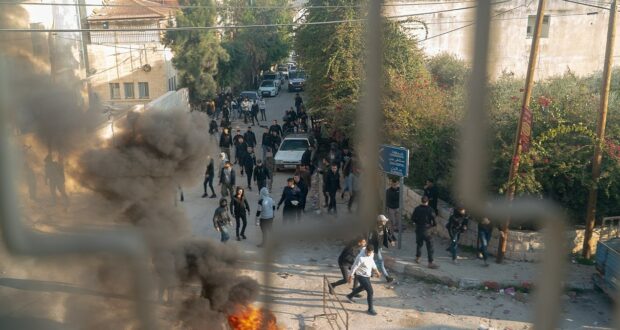21 February, 2023
Nawal Abdisamad, Research Assistant
Jenin is a city in Palestine in the Northern West Bank under the control of the Palestinian National Authority. In recent months, tensions have escalated between Palestinians and Israelis. Context is first needed to explain what has happened and the result of each action.
It all started in the early hours of 26 January, when Israeli soldiers and forces started a raid against what they had believed through their intelligence to be Islamic Jihad militants. This action resulted in 9 Palestinians dead, including a 60-year-old woman. The Israeli forces were confident those killed were militants who attacked security forces. The number of deaths this day was one of the highest recorded in the West Bank in years, which has resulted in grief and anger. Also on that day, Israelis were targeting and shooting live ammunition at residents with the sole purpose of killing and also blocking the ambulances. The following evening, a Palestinian man went along to kill 7 Israelis and injured a further three in an attack near a synagogue in Eastern Jerusalem. Among those dead were 3 elderly individuals, one man, and two women.
All this recent tension and rising violence have drawn new attention and shed light on the recent alliance that previous Israeli Prime Minister Benjamin Netanyahu struck amongst two of Israel’s most extreme, far-right political parties in order to return to power. Jenin had been peaceful for some time, and the only new development has been Israeli’s practices against the local Palestinian population and the associated rhetoric that has infected the Israeli political discourse. This can be seen when the Israeli government picked Itamar Ben Gvir as the latest national security minister, a man recently been convicted in an Israeli court of inciting racism and supporting a terrorist organisation. He praised and commended the Israeli forces for a successful operation in Jenin and stated that every single terrorist who dares to harm the police and security forces will have to pay with their lives.
Palestinians fear what is yet to come, including possible further restrictions and human rights violations and abuses in the occupied territories of the new government. There have since been thousands of Israelis who have marched on the streets in protest at what they believe to be Netanyahu’s best efforts to weaken the country’s Supreme Court. The biggest protest took place in March, where half a million Israelis joined in protest against Netanyahu’s judicial overhaul. They chanted in unison that Israel is not and will not be a dictatorship, fearing that Netanyahu’s efforts and plans will weaken the country’s courts and government branches. This is because if the legislation goes through it will give the Knesset (the Israeli parliament) the power and authority to overrule Supreme Court decisions with just a simple majority. The protests, however, were met with hostility towards the Tel Aviv police with police using stun grenades and water cannons. The protestors also blocked roads and airports in an attempt to stop the prime minister from flying out of the country.
Palestinians’ fears are valid. Over the past few years Israeli officials have failed to stop settler attacks on Palestinians and their community and to effectively step in when violence occurs. Videos of soldiers who often just stood by doing nothing as settlers engage in wanton violence against Palestinians have spread on social media. Just in October 2022, Al-Haq, a Palestinian human-rights organization reported an alarming rise in killings of Palestinians by Israeli forces and settlers citing nine deaths, including the fatal shooting that took place on 7 October of seventeen-year-old Mahdi Ladadweh during a clash between settlers and Palestinians near Ramallah.
Reports compiled by the United Nations show that on average one Palestinian has been killed a day in just the first month of 2023. Which is on track to double the tragic rate of lethal violence in the occupied West Bank last year.
Although it is fair to say that the situation has always been bad for Palestinians, it only continues to get worse by the day. The alarming increase and spike of violence in Israel and Palestine can be pinned to what Mairav Zonszein, an International Crisis Group analyst, suggests with the rise of a new far-right government solely committed to continued dispossession of Palestinians and expansion of settlements there does not seem to be any international stakeholder taking steps the crisis is only going to further escalate. With the increased number of protests and people against this new legislation, it is one of the greatest crises. Even the former defence minister who had earlier served as a member of Prime Minister Benjamin Netanyahu called the new Israeli government a ‘dictatorship of criminals’ ‘ however, it is worth noticing less and less attention is placed on the drastic implications of this new radical governing coalition has for Palestinian citizens for Israel and Palestinians living under occupation.
So far escalations are increasing and with no set answer to solve them, the future is looking uncertain. The Israeli government needs to listen to the protestors of its people and notice their people not wanting dictatorships of criminals and the continuing of new far-right governments. Will the rise of protestors be a wake-up call for the new government?
Image: IDF raid in Jenin (Source: IDF Spokesperson’s Unit / CC BY-SA 3.0)
 Human Security Centre Human Rights and International Security Research
Human Security Centre Human Rights and International Security Research




